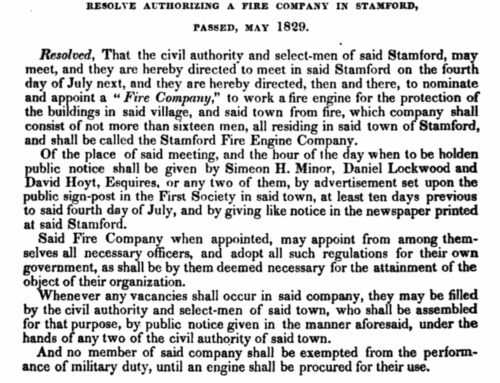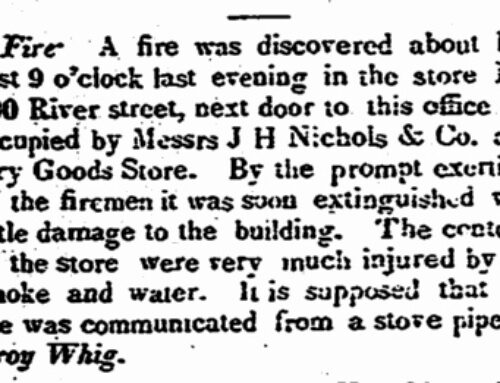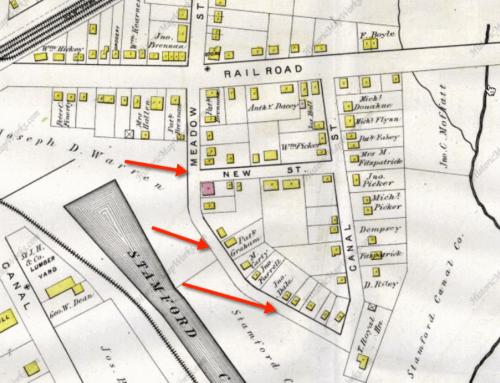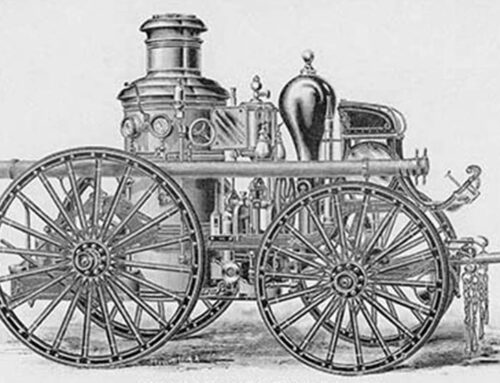Membership.
Persons to be eligible to membership in the department must be over twenty-one years of age, residents of the Borough of Stamford, citizens of the United States, of good moral character, and able to read and write. Every officer or member before entering on his duties shall sign an agreement, to be deposited with the chief engineer, that he will abide by and conform to all the rules and regulations established or which may be established by the Board of Warden and Burgesses, for the government of the department and be subject to the penalties named therein.
Every member shall be furnished with a copy of the rules and regulations.
All permanent members shall give their entire time to the interests of the department and shall be at their respective stations at all times except when granted a leave of absence or directed by the board of fire control or chief engineer to perform other duties.
Captains Or Foremen of Companies.
The captain or foreman of each company will be required to visit his station at least once in every twenty-four hours and make such observations as will satisfy himself that the material of his command is in serviceable condition and that proper order and discipline exists.
The captain or foreman must and shall be recognized and respected as the commanding officer of his company and will be held accountable for the good order of the same at all times, and he shall enforce obedience to the rules of the department. While in service at a fire the captain or foreman shall remain by and direct the operations. of his company until otherwise ordered by the chief or assistant engineer.
On arriving at a fire the captain or foreman (or in his absence some member designated by him) will immediately report to the chief or to the proper officer in command and obey instructions.
When hose is laid at fires he shall send men to remove it close to the curb and tighten the couplings and also see that it is well guarded. On returning to house if the hose requires changing he shall have it taken from the reel, washed and hung in the tower or other suitable place, and have dry hose put upon the reel ready for service.
In case any member of his company is absent from a fire or fire alarm, or a monthly wash, the sum of one dollar for each time so absent shall be charged as a forfeiture against such member.
Engineers of Steamers.
Each engineer shall have the care and management of the engine to which he has been assigned. He must see that it is always kept in a thoroughly polished and clean condition, in good working order, and ready for immediate use, with all necessary supplies. He will be held responsible for its condition in the house and at fires. He shall have the charge of the engine at fires, shall make connections to the nearest hydrant, but shall not disconnect any line of hose to make such connection without orders from the captain of his Company or superior officer.
The water in the boiler of the engine shall be seen at the third gauge cock, and a sufficient quantity of water shall at all times be carried in the tanks for any emergency. If the engine has stood three days without working turn it over a few times by hand. See that the boiler flues are cleaned after every âre when the engine has worked over three hours, and oftener if necessary, and never let the fuels get foul. The engineers of steamers shall instruct their respective assistants in the management of the engines.
Assistant Engineers of Steamers.
The assistant engineers of steamers shall under the direction of the engineer, assist in the care and management of the engine; they shall see that it is properly supplied with fuel and perform other duties required of them.
Tillerman.
The tillerman shall upon the arrival of the truck at a fire in the night light the lanterns; assist in the proper care of the horses and apparatus and be governed by the general rules and regulations prescribed for the other permanent members of the department.
Drivers.
The drivers of steamers, hose carriages, and hook and ladder trucks, shall take proper care of the horses and exercise the greatest caution in their management, keep the stables, harnesses, and everything in their charge clean and in perfect order.
They must have the horses at all times ready for im- mediate use, and must not drive them faster than is consistent with the safety of the public and the apparatus of the department, and they will be held responsible for any damage caused them through carelessness or neglect. Racing to and from fires is strictly forbidden and if the apparatus of two or more companies shall proceed to a fire on the same street they shall do so in single file.
In approaching corners, crossings, and in going downgrades, the speed of the horses must be checked. In returning from a fire the horses must not be driven in a gait faster than a walk; in cold or wet weather on arriving at a fire the horses shall be immediately blanketed and upon returning to the house they must be immediately rubbed until they are dry. All drivers shall assist in doing such other duties as the chief or assistant engineer or the captain of his company may direct.
At the nine o’clock P, M. signal the drivers shall hitch up, mount, and be seated for three minutes; then dismount, unhitch and return horses to stalls.
Members.
The members of the several companies shall, upon alarm, proceed promptly to the place of the fire, report to the captain or officer in command, and perform any duty that may be required of them. They shall on duty until relieved by orders, which shall be given only by the officer in command.
If the company to which they are attached is not required to respond to the alarm on the first call they shall proceed to their engine, hose, or truck house, and remain there thirty minutes, unless called into service or dismissed.
Duties at Fires.
At all fires, the assistant engineer arriving first shall, in the absence of the chief and until his arrival, act as chief engineer, and be obeyed and respected accordingly; the men are required to move quickly and obey the orders promptly and without criticism. In case of a fire the first engine company to arrive upon the ground may lay a line of hose, but no other without orders from a proper officer; the officers in charge of the. several ‘companies shall, immediately on their arrival at a fire, report to the officer in command, and remain for orders. No company shall leave the fire, or take the apparatus from which they have charge therefrom, without the order or permission of the officer in command. The hook and ladder companies shall locate conveniently to the fire and as soon as possible after arriving stretch the police ropes at such points as the officer in command may direct and shall keep the lines so formed until the police shall take charge of them.
Any neglect of duty, disobedience of orders, or disrespect to officers, shall be reported through the chief engineer or assistant engineers to the Board of fire control.
In all cases, the engineer of the steamer must be notified before the water is to be shut off from the steamer.
No member shall wilfully direct a stream of water upon any fireman or citizen.
No stream of water shall be directed into a building to extinguish a fire which the chemical extinguisher or a bucket of water will extinguish.
Companies borrowing hose from other companies must take it up and deliver it to the company borrowed from unless otherwise ordered.
All disputes which may arise between companies, or individual firemen, when on duty, shall be settled by the engineer in command.
No charge will be entertained against any member of the department unless made in writing.
Going to or From a Fire.
Order and decorum must be preserved when going to or returning from a fire or alarm, and all apparatus will, as far as possible, be kept on the right side of the street. To guard against collision and accident when proceeding to fires, the gongs will be struck when approaching street crossings, turning corners, and approaching the fire.
Substitutes.
Each company may have five substitutes to take the places of call members absent from the borough or disabled by sickness.
Any substitute serving shall be paid the amount of forfeit imposed on his principal for non-attendance at fires.
Bunkers.
Call-men to whom beds are assigned will be required to retire at or before eleven o’clock P. M, unless excused by the captain of their company or person charge of the house, and will not be allowed to use or occupy the beds during the day, unless deprived of their usual rest by the performance of active fire duty, or in case of sickness sufficient to require the use of the same. It shall be the duty of the captain to immediately report to the chief engineer any misconduct or violation of the rules on the part of persons occupying said beds. The occupant of each bed will be held responsible for the cleanliness of the same, and for any damage to either bed or bedding, through carelessness. All members occupying sleeping quarters in the engine, hose, or truck houses, shall vacate their beds on or before seven o’clock A. M.
Badges.
All members of the department shall be provided with a badge to be known as the regulation badge of the department, which shall be worn in a conspicuous place on the left breast, and no member shall lend his badge, on any pretext whatever.
All members of the department shall be provided with a fire hat which shall always be worn by them while on duty at a fire.
Any member losing his badge shall report to the chief engineer, and use all due diligence to recover the same.
No person will be recognized as a member of the department unless wearing his fire hat or badge at a fire.
Roll Call.
Upon returning from a fire or an alarm of fire, the captain or officer in command shall call the roll, and report to the chief engineer any member absent, and the excuse if any, for the same. In the absence of the captain, the person in charge of the house will call the roll.
Leave of Absence.
No member of the department shall absent himself from the Town without a permit from the chief or assistant engineers, and first having procured a substitute to the acceptance of them.
No officer of the department shall be absent from the Borough for twenty-four consecutive hours without notifying the Board of fire control and the chairman of the Committee on fire department and water.
Supplies.
All requisitions for supplies or repairs must be made to the Board of fire control, and by them made to the Committee on fire department and water.
Care of Horses.
The system of feeding shall be as follows, particular care being taken not to feed or water the horses while warm:
Four quarts of oats morning, noon and night, with about ten pounds of hay, will constitute the daily allowance for each horse, and must not be exceeded without orders of the board of fire control. But when it shall be ascertained that a less allowance is sufficient, the drivers will exercise discretion as to the quantity. Requisitions for forage shall be made to the board of fire control.
The stalls shall be cleaned and horses fed by seven o’clock in the morning, and after breakfast the horses groomed and harness cleaned.
After the nine P. M. signal the horses shall be bedded for the night.
Horses sick or disabled shall be immediately reported to the board of fire control.
When horses are in the shop for shoeing, the drivers shall remain with them, and shall report to the chief engineer any unnecessary delay and ay work improperly executed.
Riding to Fires.
The drivers of steamers, hose carriages, and trucks, will be held responsible for any unnecessary overloading, and will in all cases judge of the ability of the horses, the condition of the streets, and the distance to travel; the men will mount and dismount as ordered by them.
All officers will avail themselves of any opportunity to ride to fires to the exclusion, if necessary, of the men; on returning from fires the members shall walk, keeping near the apparatus.
Houses.
Houses of the department shall be open at all reasonable hours for visitation or inspection by officials or citizens, except on Sunday, when they must be closed, and it is made the duty of the captain, or person in charge, to see that order and quiet are preserved; houses must be closed at eleven o’clock P. M., each day, after which no loud talking will be allowed on the premises.
The permanent members of each house shall, as often as once in each week, scrub the floors in their respective houses, and at all times keep them neat and clean. The officers in charge of any house shall personally attend to receiving visitors, whether officers of the department or citizens.
Citizens visiting the houses shall be courteously treated, have reasonable questions answered, and any proper information given.
Conduct
SECTION 1. All members of the department are strictly required in their intercourse with each other, social or official, to observe a courteous demeanor, and officers or men in addressing each other will do so in a respectful manner.
While on duty at fires the greatest degree of silence compatible with a proper discharge of duty will be required; any boisterous conduct will be cause for censure by the board of fire control. ·
SECTION 2. Members of the depart1nent will not be allowed to lounge or loiter outside of the doors of the engine or truck houses, or indulge in loud or boister ous conversation within hearing of passerby’s on the street; persons, not members will not be allowed to frequent or loiter in or around any engine house.
SECTION 3. No profane 0r ungentlemanly language or disorderly conduct will be allowed on the part of any officer or member of the department.




